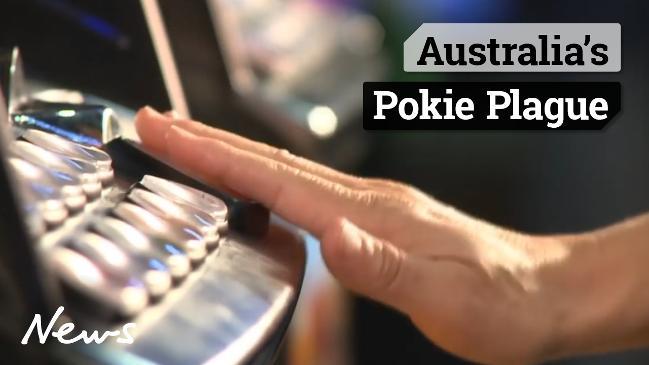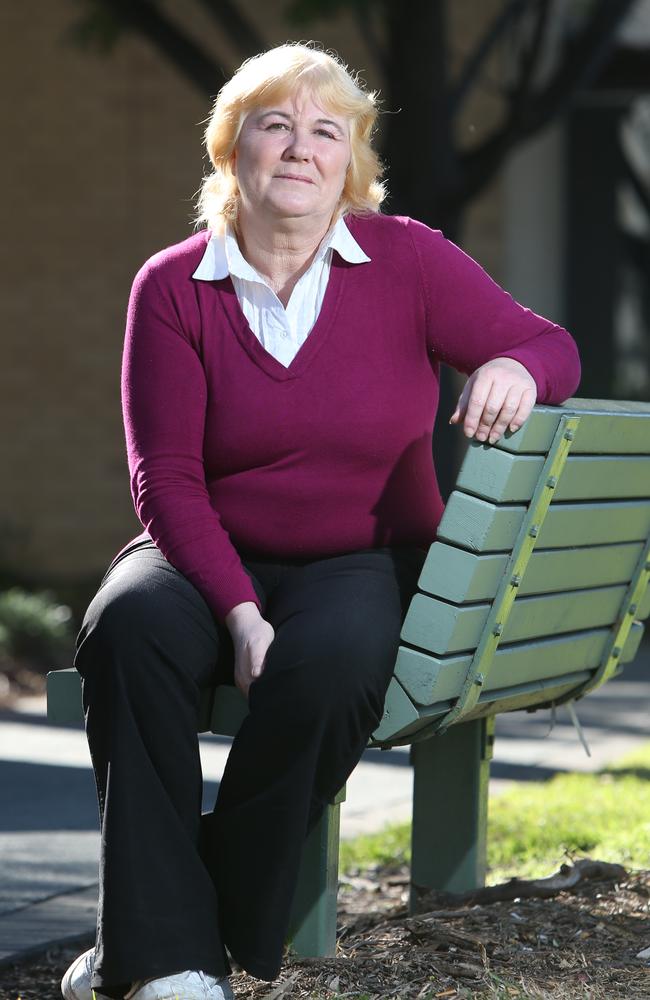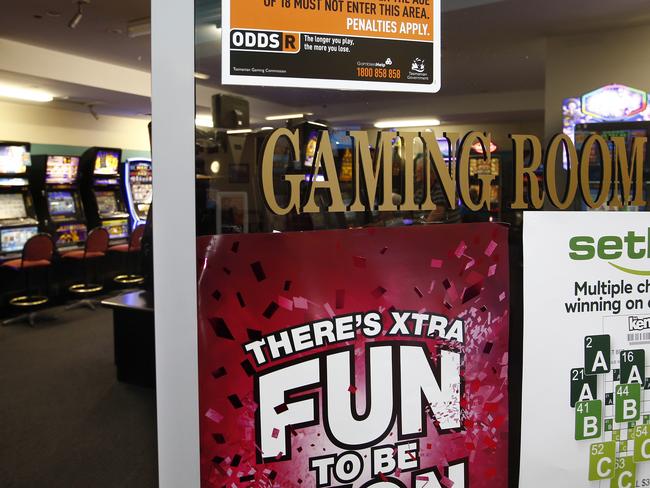How a working mum found herself holding up a store with a fishing knife
SHE was a hard-working mother with two beautiful children, but a very modern addiction saw her lose everything — including her kids.

WHEN Sharon Hollamby was at her lowest point, she got in her car to drive down the freeway near her Adelaide home, planning to take her own life. At that point, her memory goes blank.
“Next thing I know, a guy was banging on the window trying to stop me getting away,” she says. Sharon had just tried to rob a convenience store with her son’s fishing knife.
“I’ll always feel regret for that,” she says. “I’ll always feel sorry for the lady I did that to. It was a cry for help ... I was a mess.”
Sharon was one of many addicts who spoke to news.com.au for our series on Australia’s devastating pokies addiction (read part one and part three here). Their stories are wretchedly similar. The problem often starts innocently enough, with a casual habit at a local club, a little buzz from a small win.
“People go there on a social basis, go for tea, go and gamble,” says the now 58-year-old. “Something will happen in their lives and they go to the machines to forget. It might be the death of a family member or loss of a job.”
For Sharon, it was an accident that stopped her from working and socialising. Her nephew had recently died from an overdose and her father was ill with leukaemia. One day, she put a few coins into a machine while out with a friend — and won $400. “That’s where my problems really started,” she says. “It really didn’t take long for me to become hypnotised.”
It was in this hypnotic state that she carried out the robbery. She could only tell police she was sure she had done and said whatever the convenience store worker claimed. While Sharon got away with a good behaviour bond, she hated herself. But even her “rock bottom” didn’t stop her from gambling.

‘THE URGE TO NUMB OUT WAS OVERWHELMING’
The day before her trial, she found out her father was dying. “It was a dreadful time of life for me and my family,” she says. “The case was a blur.
“When I went to the hospital, the urge to escape, to numb out, was overwhelming.”
Sharon went back to the pokies.
The mother of two eventually recovered with the help of support groups, anti-depressants and a psychiatrist, but lost $200,000 and her two children, who stopped speaking to her.
She now helps others affected by gambling — right now, a 21-year-old who is suicidal because of the money he’s spent and a widower whose wife took her own life because of her addiction.
Looking at this sweet, South Australian mother, it’s hard to believe she could have travelled so far down such a destructive path. But even though her compulsive habit ended years ago, Sharon says she still feels the lure of the machines. During a recent difficult patch, when she found herself sick in hospital and suffering stress over the landmark court case on poker machines that started on Tuesday in the Federal Court, the urge returned. “Go to the pokies for a while, just forget,” a voice whispered.
The case centres on one particular machine, Dolphin Treasure, which Monash University’s public heath lecturer Charles Livingstone bought and took apart. The lead applicant, former addict Shonica Guy, will allege the machine is “deceptive and misleading” because of features including “near misses” and “losses disguised as wins” and a stacking of the odds against the punter. Crown Resorts and Aristocrat Technologies deny the allegations, but if the case succeeds, the machine will have to be changed or removed, and it could have major ramifications for the gaming industry.
Sharon doesn’t believe that changing the machines or other “harm minimisation” measures can fix Australia’s problem. She thinks measures suggested by anti-gambling campaigners and the Greens, such as capping bets at $1 a line (you can spend as much as $10 a push in NSW), don’t do enough.
“They’re just going to keep people there longer, until they lose all their money,” she says. “For me it was 15 years ... The most I’d walk out with was 95 cents.”

One prevailing belief about gambling addiction is that it’s about a desire for money. But researchers have found, bizarrely, that sometimes when addicts do win the jackpot, they feel a curious sense of deflation, an anti-climax.
That, the former addicts I speak to explain, is because the aim quickly becomes not to win money, but just to keep playing, and stay in that trance forever. “The money really doesn’t matter, it’s what else you lose,” says Sharon. “I lost contact with friends, I worried about family and friends finding out. It really isn’t so much about the money as the fear you live with the whole time. You’re constantly in a state of anxiety and stress when you’re gambling like that.”
Despite the large donations made to communities by clubs poker machine profits, Sharon says we’d be far better off without this destructive force on our communities. “Travelling around Australia, I’m seeing how small towns are being massacred because one pub has pokies,” she says. “That’s where the money goes now.
“Before, we had community events, chook raffles. Now, smaller shops are closing, there’s no work around.
“If we didn’t have pokies, that money would be spent in communities, it would create employment.
“People think they’re not affected but if you’ve had your purse stolen, your car siphoned off, you can’t find a job — you’re affected.”
Sharon says the only solution is to totally ban these machines from pubs and clubs across the country. The only state with such a law is Western Australia, where the pokies never made it out of casinos. But putting the genie back in the bottle may not be easy, with gaming machines contributing so much to state governments in taxes, and powerful lobbyists in the industry.
“If the machines had stayed at the casinos in Adelaide, I’d never have become addicted,” says Sharon. “It was the proximity, having one on every street corner, that made me become addicted so hard and so quick.
“If they suddenly put poison in chocolate and said ‘don’t eat too much’, you’d soon want it off the shelves. That’s what these machines are — poison.”
If you or someone you know has a problem with gambling, contact Gamblers Anonymous for help.
Leave a comment below, share your story with emma.reynolds@news.com.au or tweet @emmareyn. News.com.au’s series on Australia’s pokies obsession continues tomorrow.




